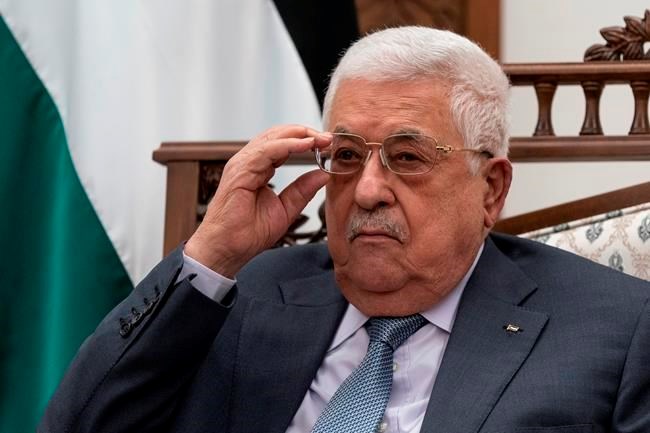OTTAWA — The Liberal government's statements about its commitment to a two-state solution to the Israeli-Palestinian conflict are not enough to advance this outcome as real action is needed to push the parties in a positive direction, says an expert.
Rex Brynen, a political science professor at McGill University, said Ottawa should raise the cost of behaviours that undermine the two-state solution by supporting the International Criminal Court's investigation into settlement activity and military operations in Gaza.
He said that would signal to various parties that there are costs associated with their inappropriate behaviour whether that is Israeli settlement activity or Hamas firing rockets at Israeli cities.
"(Stating that) 'We support a two-state solution isn't going to move any closer to a two-state solution," he said.
Prime Minister Justin Trudeau spoke Tuesday with the Palestinian Authority President Mahmoud Abbas ahead of his foreign affairs minister's visit to Jordan, Israel and the West Bank later this week.
A readout of the call said Trudeau discussed political and security developments in the region with Abbas.
The readout said Trudeau underscored his belief in the right of Palestinians and Israelis to live with dignity, without fear, and with their human rights respected, including the creation of a Palestinian state living side-by-side in peace and security with Israel.
Marc Garneau’s office said last week that his visit to the Middle East aims to advance Canada’s support towards the goal of a comprehensive, just and lasting peace in the region and a two-state solution following a deadly 11-day war between Israelis and Palestinians last month.
The minister’s visit to the region comes weeks after a ceasefire ended the war that left at least 230 Palestinians and 12 Israelis dead.
Brynen, who is a former longtime consultant to the Canadian government on Middle East issues, said Garneau will tell the leaders in the region that a two-state solution is the only viable resolution of the conflict and the parties should not take actions that compromise that solution, but these statements won't be useful.
"I don't actually think (Garneau) will do anything useful at all," he said. "I'm really cynical about visiting the Middle East and making nice statements about our commitment to a two-state solution because it's really not enough to help and no one much cares about what we think."
He said the government believes in a two-state solution but it will not do anything that would be a significant contribution to moving in that extremely difficult direction as the prospects for that solution are eroding.
Mira Sucharov, a political science professor at Carleton University, said the two-state solution is becoming more and more unlikely to happen with increased settlement building by Israel and a very little political will on the Israeli side to make any major withdrawals or even settlement freezes.
"(Israel's) incoming Prime Minister Naftali Bennett, for his part, has said that he wanted to annex parts of the West Bank," she said.
"In the course of his coalition agreement, he agreed to hold off on that. So, it's unlikely that we'll see annexation on the one hand, but it's also very unlikely that we'll see any significant change."
Israel’s Parliament approved two weeks ago a new rotation government led by the leader of The New Right, a right-wing political party, Naftali Bennett, and the leader of Yesh Atid, a centrist political party, Yair Lapid, ending Benjamin Netanyahu's 12-year grip on power.
Human Rights Watch called on the Trudeau government in April to take action against alleged “crimes against humanity” by the Israeli government, which it labelled an “apartheid” state in a report that accused Israeli authorities of methodically discriminating against Palestinians within both Israel and the West Bank and Gaza Strip.
The Israeli government refused the report and accused the New York-based organization of harbouring an “anti-Israel agenda.”
Brynen said that a couple leading Israeli human rights organizations also labelled the country "akin to apartheid" because the situation is no longer a temporary one of Palestinians being denied political rights pending resolution of conflict, he said.
"It looks permanent or semi-permanent."
Sucharov said the basic question now is whether Israel is able live with the status quo.
"They've proven very much so that they can," she said.
"How to persuade Israelis who hold the lion's share of the power to seek political change is the great obstacle before us."
This report was first published by The Canadian Press on June 29, 2021.
—
This story was produced with the financial assistance of the Facebook and Canadian Press News Fellowship.
Maan Alhmidi, The Canadian Press



